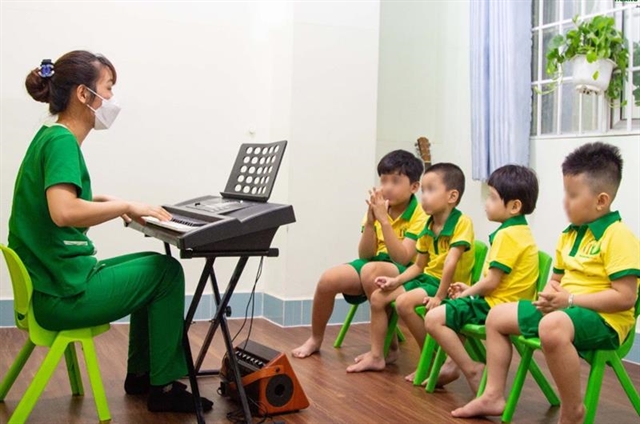 Society
Society

 |
| A teacher at the centre playing music to four autistic children. Teaching the children always demands a departure from traditional teaching techniques. — Photo dongnai.gov.vn |
HÀ NỘI — In the bustling city of Biên Hòa lies the Hoàng Đức Centre where caring teachers spread love and compassion to make a difference in autistic children's lives.
Unlike conventional classrooms where a standardised curriculum serves as a guide to conduct lessons, teaching children with autism requires a customised strategy that adapts to the individual needs of every single child.
Nguyễn Thị Sáu, a teacher at the centre, has eight autistic children under her care. Her daily work involves the preparation of eight separate lesson plans tailored to each child's specific problems.
Their behaviours are far from similar. One child finds concentrating difficult and resists sitting still for more than five minutes. One throws tantrums and hits his head against the wall as an act of defiance. Some exhibit emotional distress through loud outbursts and refusal to eat.
It requires her repeated efforts, day by day, to keep them calm and instruct them in given tasks. The path to progress is steep, but she has a belief that her dedication will bear fruits one day.
"I've spent seven years in this profession, but not a single summer day has been a break for me," said Sáu.
She said there had been moments when some children, unable to control their behaviour, lashed out at her, but she refused to give in. She knew that if they were left to their own devices, their lives would be much more difficult in the future.
Lê Thị Thanh Hồng, another teacher at the centre, said each child has a unique world for themselves. The way they express their cognitive abilities and do daily activities varies significantly. Patience is the key to stepping into their "secret world", playing with them, and getting them engaged in social interactions.
The teacher also revealed that her dedication to the profession is fueled by the joy of seeing improvements in children under her care. Some have learned to fold their hands to greet their parents, some to hand-feed themselves, and some to sit quietly listening to her stories for hours.
"For children with autism, performing these tasks is nothing short of a remarkable feat,” said Hồng.
Nguyễn Thị Mai, director of Hoàng Đức Centre, vividly recalls a child who was at the age of four but could not speak nor play, and did not interact with other people. He also had a severely limited attention span when he was admitted to the centre.
After three months of extensive care, he changed for the better. He managed to learn to play with toys and say his parents' names. Now, he has been enrolled in an elementary school and can blend in with his peers perfectly.
"There was one time when his grandparents came to pick him up after school, they were astounded to hear him uttering 'grandpa, grandma'," Mai recalled.
It was at that moment that the elderly couple burst into tears of joy. These seemingly small changes have triggered overwhelming happiness for both his family and the teachers at the centre.
In the centre, the love for autistic children has translated into a motivation to cultivate an environment where they can feel safe and reveal their true feelings. It is the motivation that has bonded the teachers and their children together. — VNS




